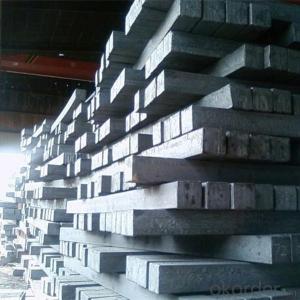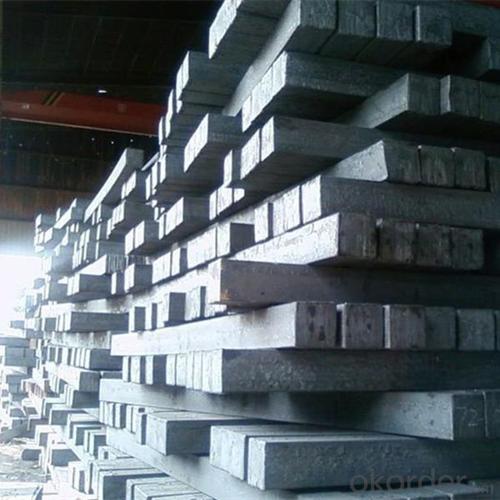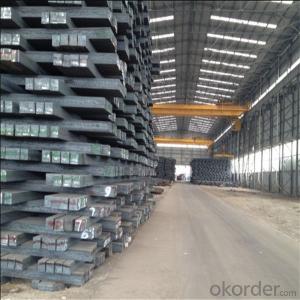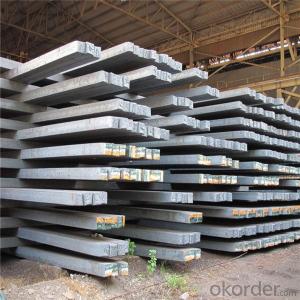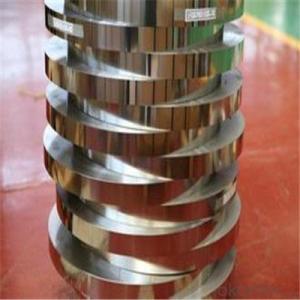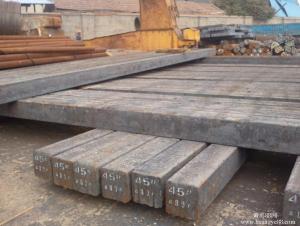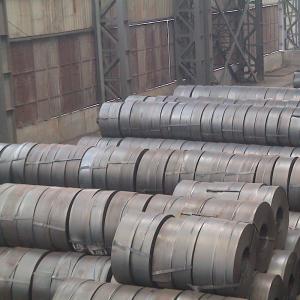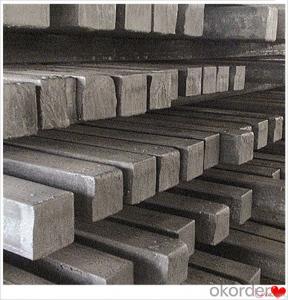Square Steel Billet Q195 Q235 Q275 150X150 Made in China
- Loading Port:
- China main port
- Payment Terms:
- TT OR LC
- Min Order Qty:
- 1000 m.t.
- Supply Capability:
- 50000 m.t./month
OKorder Service Pledge
Quality Product, Order Online Tracking, Timely Delivery
OKorder Financial Service
Credit Rating, Credit Services, Credit Purchasing
You Might Also Like
Specification
Standard:
GB
Technique:
Hot Rolled
Shape:
Square
Surface Treatment:
Dry
Steel Grade:
Q195,Q215,Q235
Certification:
SGS
Thickness:
60mm-150mm
Width:
60mm-150mm
Length:
6-12m
Net Weight:
23mt
Packaging:
Bare Packing
Square steel billet, square bar, mild steel billet best price from China manufacturer
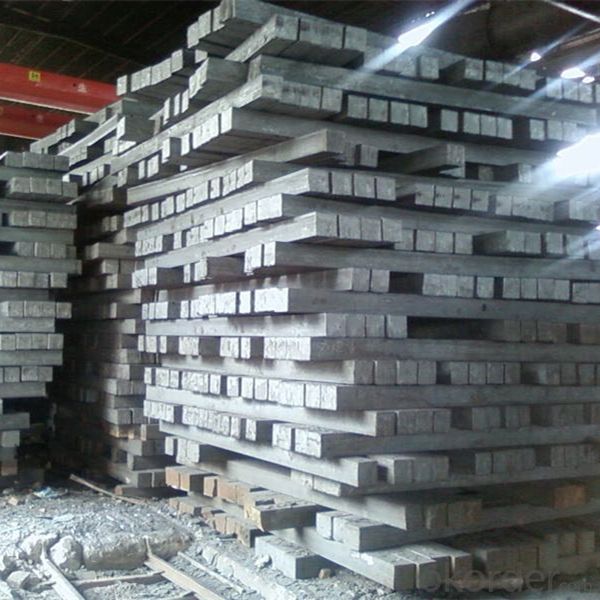
| Name: | Square bar |
| LENGTH: | 6 meter to 12 meter (+ 50mm) |
| Size: | 100*100, 120*120, 150*150, 200*200 |
| Grade: | 3SP,5SP,Q235,20MnSi. |
| Shape: | Square, Round |
| Technique: | Hot-Rolled |
| Standard: | ASTM/GB |
| BENDING | No more than 5mm in 1 meter No more than 30mm in 6 meter No more than 60mm in 12 meter |
| ANGULAR TWIST | No more than 1 degree per meter and not more than 6 degree over 12 meter length. |
| Chemical composition | C, Si, Mn, P, S, N, etc |
Product Description
Chemical Properties
| Size | 60*60/90*90/100*100/120*120/150*150 |
| Length | 6000mm-12000mm |
| Standard | GB |
| Application | To produce bars or other applications |
| Grade | Q195/Q235/Q275/3SP/5SP/20MnSi |
| Packing terms | TT/LC |
| Package | Mill's standard packing or as client's requirement |
| Delivery time | Within 10-30 days after receiving the deposit or LC |
Chemical Composition
| Standard | C(%) | Mn(%) | S(%) | P(%) | Si(%) |
| Q195 | ≤0.12 | ≤0.50 | ≤0.040 | ≤0.035 | ≤0.30 |
| Q235 | ≤0.20 | ≤1.40 | ≤0.045 | ≤0.045 | ≤0.35 |
| Q275 | ≤0.22 | ≤1.50 | ≤0.045 | ≤0.045 | ≤0.35 |
| 20MnSi | 0.17-0.25 | 1.2-1.6 | ≤ 0.050 | ≤ 0.050 | 0.40-0.80 |
| 3SP | 0.14-0.22 | 0.40-0.85 | ≤ 0.050 | ≤ 0.040 | 0.05-0.15 |
| 5SP | 0.28-0.37 | 0.50-1.00 | ≤ 0.050 | ≤ 0.040 | 0.15-0.30 |
Shipment:
Logistic department established and serves for sales department. Cargo is delivered to the port by our own trucks. Both bulk and container service are available and cargo shipment is in hands of logistic staffs
- Q: Nickel is ferro magnetic in nature. But when it is added with stainless steel, it makes stainless steel non-magnetic. What is the structural changes happened with the presence of nickel?
- Steel is magnetic because of the alignment of the spin in the electrons of the atoms in the crystaline matrix of the steel. Nickel atoms are not the same size as Iron atoms and Chromium atoms. by having several different sizes of atoms in the alloy, it prevents a uniform crystaline matrix from being formed. If you imagine a box of marbles that are all the same size, they will all settle into a regular pattern in the box. But a bunch of mismatched marbles will be jumbled together in irregular patterns. This prevents the magnetic properties of either element from asserting itself.
- Q: Are steel coils resistant to rust and corrosion?
- Yes, steel coils are resistant to rust and corrosion. Steel coils are typically made from carbon steel or stainless steel, both of which have excellent corrosion resistance properties. Carbon steel coils are often coated with a protective layer, such as zinc or a polymer coating, to enhance their resistance to rust and corrosion. Stainless steel coils, on the other hand, are inherently corrosion-resistant due to the presence of chromium, which forms a protective oxide layer on the surface of the steel, preventing rust and corrosion. However, it is important to note that the level of resistance to rust and corrosion may also depend on the specific grade and quality of the steel used in the coils, as well as the environmental conditions they are exposed to.
- Q: What are the different types of steel coil edge finishes?
- There are several types of steel coil edge finishes, including mill edge, slit edge, round edge, and deburred edge.
- Q: How are steel coils used in the food processing industry?
- Steel coils are commonly used in the food processing industry for various purposes such as storage, transportation, and cooking. They are often used to create food storage containers, tanks, and silos, ensuring a safe and hygienic environment for storing raw materials or processed food. Steel coils are also used in the construction of equipment like ovens, grills, and fryers where they provide heat conductivity and durability. Additionally, steel coils are used for manufacturing conveyor belts and other machinery parts, allowing for efficient food processing and packaging operations.
- Q: how many persent of manganese in all types of carbon steel
- No problem with other answers but there is a high carbon/manganese steel called Hadfields Steel which has been used as armour plate in pilots seats in fighter aircraft in the second world war.This steel contains about 13% manganese and about 1.5 % carbon and is non-magnetic because it retains it's high temperature crystal type(austenite).When it is stuck with a bullet it absorbs the energy of the strike by changing crystal structure to the magnetic form of iron(in this case shock Martensite),I should think that it still has a role in the scoops and picks in earth-moving and farming blades.Well you did ask about all types of carbon steel!
- Q: How are steel coils used in the manufacturing of flooring materials?
- Steel coils are commonly used in the manufacturing of flooring materials as they provide structural support and durability. The steel coils are typically used as a base layer that is sandwiched between other materials, such as wood or vinyl, to create a strong and sturdy flooring surface. The coils help to distribute weight evenly and prevent the flooring from sagging or warping over time. Additionally, the steel coils can also enhance the impact resistance and overall lifespan of the flooring, making it suitable for high-traffic areas.
- Q: What is the difference between hot rolled and cold rolled steel coils?
- The main difference between hot rolled and cold rolled steel coils is the process by which they are made. Hot rolled steel coils are produced by heating the steel above its recrystallization temperature, allowing it to be easily shaped and formed. This process results in a rougher surface finish and less precise dimensions. On the other hand, cold rolled steel coils are produced by further processing hot rolled coils through a series of rolling mills at room temperature. This process results in a smoother surface finish, tighter tolerances, and improved mechanical properties.
- Q: Can I ever get my classical guitar reinforced so it can have steel strings on it?
- It would work out easier to just get a new guitar.
- Q: I need steel toe shoes for a workplace, where can I get them?I live in Surrey,UK.
- by on the internet or ppe clothing shops
Send your message to us
Square Steel Billet Q195 Q235 Q275 150X150 Made in China
- Loading Port:
- China main port
- Payment Terms:
- TT OR LC
- Min Order Qty:
- 1000 m.t.
- Supply Capability:
- 50000 m.t./month
OKorder Service Pledge
Quality Product, Order Online Tracking, Timely Delivery
OKorder Financial Service
Credit Rating, Credit Services, Credit Purchasing
Similar products
Hot products
Hot Searches
Related keywords
